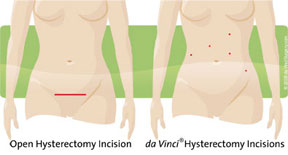Robotic-assisted procedures represent the latest development in minimally invasive surgical techniques, providing surgeons with a precision tool that uses the same small incisions as conventional laparoscopy. Several specialties offer robotic-assisted procedures to treat various conditions.
UC Davis Medical Center now offers robotic-assisted procedures to treat cardiovascular disease. This state-of-the-art program includes an experienced and highly trained team of surgeons, nurses and support staff who specialize in the use of a computer-controlled surgical system that can provide all the benefits of conventional open-heart surgery with the recovery advantages of a minimally invasive technique. Specific procedures include:
- Coronary artery bypass
- Mitral Valve repair
- Atrial fibrillation
Learn more about cardiothoracic robotic surgery »
UC Davis Medical Center provides minimally invasive robotic-assisted procedures for several colorectal conditions, including colon and rectal cancer resections, sphincter preservation surgery, inflammatory bowel disease-related procedures and procedures for rectal prolapse. Specific procedures include:
- Segmental and total colectomies
- Low anterior and abdominoperineal rectal resections
- Rectopexies
- Transanal robotic surgery
- Learn more about colorectal robotic surgery
Gastrointestinal robotic surgery
UC Davis Medical Center provides minimally invasive robotic-assisted procedures for several gastrointestinal conditions, including hiatal hernias, associated esophageal reflux, achalasia (a disorder of the muscle at the end of the esophagus), and some conditions that require gallbladder removal. Specific procedures include:
- Heller myotomy
- Hiatal hernia repair
- Nissen fundoplication
Learn more about gastrointestinal robotic surgery »
Gynecologic robotic surgery
 UC Davis surgeons offer minimally invasive and robotic-assisted surgeries for the treatment of cancer and other conditions involving the female genital tract. These conditions include:
UC Davis surgeons offer minimally invasive and robotic-assisted surgeries for the treatment of cancer and other conditions involving the female genital tract. These conditions include:
- Endometrial and cervical malignancies
- Ovarian cancer
- Complex gynecologic problems
Because they are less invasive and do not require large incisions, minimally invasive and robotic-assisted procedures can be ideal for many gynecological surgeries to maintain surgical precision while minimizing recovery times and scarring. This includes many hysterectomies, which are commonly performed for both benign and malignant conditions.
Learn more about gynecologic robotic surgery »
Neurological robotic surgery
UC Davis Health offers the first comprehensive robotic neurosurgery program in our region and one of the most comprehensive in California, providing robotic surgery for cranial, spine, and endovascular procedures to treat conditions including:
- Movement disorders, including deep brain stimulation (DBS) treatment
- Epilepsy
- Spine Disorders
- Cerebrovascular disease (including stroke and aneurysms)
- Brain tumors
Neurological surgery requires the highest levels of precision and delicacy. One of the greatest enhancers of surgical precision and safety available today is the addition of robotic technology to the operation room. Surgical robots are often used across specialties and thus further drive interdisciplinary clinical care, research, and education. For example, the endovascular robot acquisition and surgical services are a joint venture of Neurological Surgery and Radiology and the spine robot supports the UC Davis Comprehensive Spine Program, led by Neurological Surgery, Orthopaedic Surgery, Physical Medicine and Rehabilitation, and Pain Management.
Learn more about neurological robotic surgery »
Otolaryngologic robotic surgery
 Robotic-assisted surgery. No incision, no scars.
Robotic-assisted surgery. No incision, no scars.
 Traditional surgery with extensive incision.
Traditional surgery with extensive incision.
UC Davis Medical Center was the first hospital in Northern California to offer robotic-assisted surgery for conditions of the head and neck. Gregory Farwell, professor of otolaryngology and director of head and neck oncology and microvascular surgery, uses a surgical robot to aid in the removal tumors of the throat, including the pharynx, larynx and epiglottis.
Learn more about otolaryngologic (head and neck) robotic surgery »
Urologic robotic surgery
Robotic-assisted prostatectomy video
UC Davis urologists offer minimally invasive robotic-assisted surgery for a number of urological diseases and conditions including:
- Prostate cancer
- Kidney cancer
- Kidney dysfunction
- Pyeloplasty in children
- Ureteroureterostomy in children
Because it is minimally invasive, the precision of robotic technology is ideal for delicate and complex urologic surgeries. These include prostatectomies, in which the target site is tightly confined and surrounded by nerves affecting urinary control and erectile function. Other procedures include nephrectomy and adult pyeloplasty.
